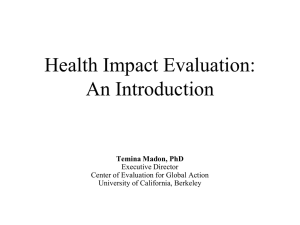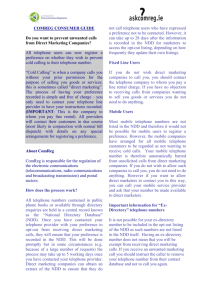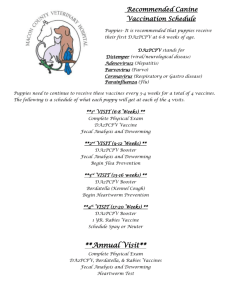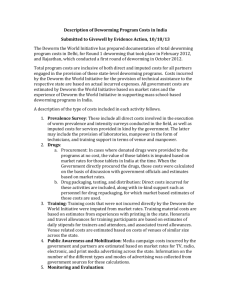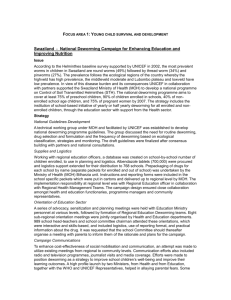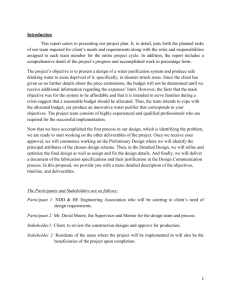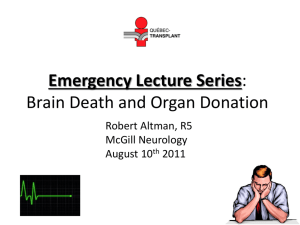Preparations for NDD 2016 - National Rural Health Mission
advertisement
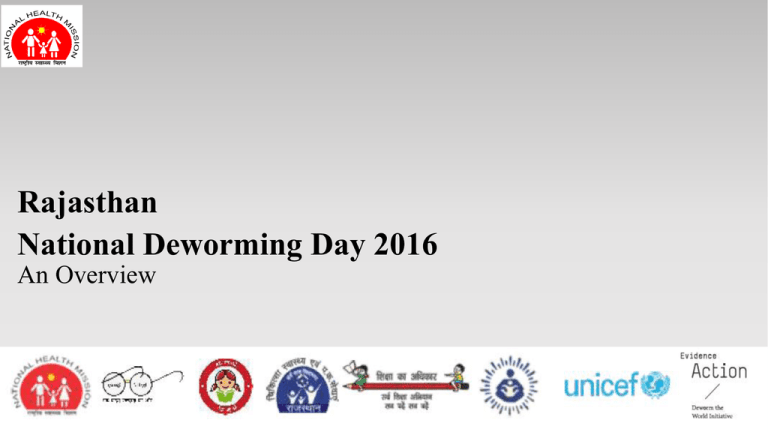
Rajasthan National Deworming Day 2016 An Overview 1 Presentation Outline Prevalence of Worm Infection Effects of worms Complementary Ways of Addressing Worm Infections National Deworming Day (NDD ) 2015: Key Achievements Preparations for NDD 2016- At National Level Rajasthan National Deworming Day 2016 : Objectives and Targets Program updates for Rajasthan National Deworming Day 2016 Key Decisions Potential Challenges Next Steps 2 Prevalence of Worm Infection Children aged 1 to 19 years (preschool and school-age children) are at-risk of parasitic intestinal worm infections, known as Soil Transmitted Helminths (STH). Worms can cause anemia and nutritional impairment, thereby impairing mental and physical development. Round worm Whip worm Hook worm Effects of Worms = Debilitating1 Transmission of worm infections1: • Ingestion of infected eggs or larvae contaminating food, hands, or utensils • Penetration of the skin by infective larvae contaminating the soil Common consequences of intestinal worms: Intestinal bleeding, impaired iron status, anemia Malnourishment / malabsorption of nutrients, loss of appetite Stunted growth Impaired mental and physical development and cognition Exhaustion and poor concentration Weakened immune systems 1Source: “Helminth control in school-age children: A guide for managers of control programes” second edition, World Health Organization 2011 Complementary Ways of Addressing Worm Infections Short Route Approach Objective Deworming drug administration via NDD Treatment: • Reduce morbidity • Reduce individual worm burden Long Route Improved sanitation and waste management E.g., improving WASH facilities in schools Improved hygiene education and awareness. Ex, delivered via public health system, community or schools Prevention • Control transmission • Reduce reinfection Long term actions require sustained commitment- financial and human resources, behaviour change and multiple efforts across departments, and therefore short term actions - ‘Deworming’ are of critical importance 5 School/ Anganwadi based deworming & fixed day approach Safe • • The WHO recommends mass school-based deworming as a safe treatment for all preschool and school-age children There are no significant side-effects of treatment Why fixed day approach? Cost-effective • School-based deworming costs <50 cents per child per deworming treatment, earning it a ‘best-buy’ in development rating by the Copenhagen Consensus, GiveWell, and the Abdul Jameel Poverty Action Lab at MIT (JPAL) Scalable • Due to leveraging existing school infrastructure, schoolbased deworming has the potential to reach >80% of pre-school and school-age children • An optimal mechanism cost effective way to high coverage • Campaign style messaging can be leveraged to increase awareness • Support structures could be in place to easily track and respond to any cases of adverse events • Mobilization of stakeholders is easy • Effective monitoring 6 How to Treat Worm Infection? • Albendazole syrup 5 ml (Half Bottle 200 mg)/Half tablet for children between 1 -2 years • Albendazole tablet (400mg) for children > 2 years Left: Albendazole tablet, Right: Albendazole syrup Albendazole is a safe drug for both infected and non infected children and adults and has been used to treat millions of people across the world for STH National Deworming Day-2015: Key Achievements • Commitment at National level with launch of National Deworming Day (NDD) 2015 by MoHFW to implement mass deworming program in Campaign Mode – on February, 10 followed by Mop Up Day on February, 13. • 10 States and one UT participated, covering 272 districts • 10.31 crore children targeted* in the age group of 1-19 years • National launch by Honb’le Union Minister of Health & Family Welfare on February 9, 2015 in Jaipur. • The program successfully dewormed 8.98 crore children across 4.70 lakh schools and 3.67 lakh anganwadi centers 8 *Source-NDD report 2015 released by Ministry of Health and Family Welfare, GOI dated November 27, 2015 Rajasthan National Deworming Day-2015:Key Achievements Successful implementation of Round 3 of school and anganwadi based mass deworming on February 10, 2015 with collaborative effort between the Department of Health, Department of Education, Department of Women and Child Development with technical assistance from Evidence Action – Deworm the World Initiative and UNICEF Deworming Coverage-2015 Coverage No. of school enrolled children dewormed No of non-enrolled/ out of school children dewormed No. of AWC registered children dewormed % Coverage of NDD 2015 Training details Number of teachers trained Number of anganwadi functionaries trained 64,63,898 6,83,631 47,11,239 84% 71,985 58,359 *Source: Data submitted by Government of Rajasthan to Ministry of Health and Family Welfare, Government of India dated 15th April, 2015 9 Rajasthan National Deworming Day-2015:Key Achievements 10 National Deworming Day - 2015 11 National Deworming Day- February 10, 2016 Objective: To deworm all preschool and school-age children (enrolled and out-of-school) between the ages of 1-19 years through the platform of government schools, private schools, madarsa and anganwadi centers with fixed day approach. New Initiative: - Engage private schools to ensure coverage of beneficiaries currently being left out - Standardizing denominator of all target age group • Children enrolled in government schools • Children enrolled in private schools • Preschool children registered at anganwadi centres • Preschool children not registered (1-5 years) with anganwadi centres • School age children who are out-of-school (6-19 years) - Increased reach to all children who are not attending school and anganwadi through greater engagement of ASHA *Albendazole 400 mg tablets to be administered to children 2- 19 years. **Albendazole 200mg syrup to be administered to children 1- 2 years 12 Preparations for National Deworming Day-2016:Updates so far Review Meet NDD 2015 Held on Oct 27, 2015 with participation of 11 states/UT Revisions in guideline for NDD 2016 Learnings and best practices from state guided revisions under Operational guidelines NDD 2016 NDD 2016 Orientation Meet Held on Dec 1, with participation 36 states and UT’s under the chairmanship of, Joint Secretary, MoHFW, *The revised NDD 2016 guidelines and relevant NDD resource kit available on MoHFW-NHM website http://nrhm.gov.in/component/content/article.html?layout=edit&id=519 1) Letter from JS, MoHFW to all states on NDD dates, and related preparation 2) Inter-departmental convergence meeting (Health, WCD, Education, PRI) for effective roll out of program 4) Letter from JS to other ministries (Education, WCD,PRI) for greater collaboration 5) Joint directives from Secretaries (Heath, Education and WCD) issued to all states for convergence 6) Uploading of the NDD 2016 resource kit on NHM 13 website (link below) Rajasthan National Deworming Day-2016:Targets Parameter Target Institution Beneficiaries No of Districts 33 No of Blocks 249 (H)/257 (E) No of government schools 69,269 75,24,294 No of Private schools 34,056 80,73,369 No. of Kendriya Vidhyalaya 70 63,076 No. of Navodaya Vidhyalaya 34 16,325 No. of Madarsas 2359 183825 No. of AWCs in the state 60,163 74,35,569 No. of unregistered children in AWC (1 – 6 years) 246767 No. of out-of-school children (6-16 years)* 16,09,344 Total Target 2,51,52,569 Sources: Data related to department of education is as per DISE 2014-15, Data for KVs and NVs is as per their respective websites, Data of AWCs includes data taken from Aug 2015 MPR of ICDS, number of registered children (1-6 year) is calculated on the basis of 0-6 year population in ICDS MPR Aug 2015 applying a group proportionate to census, number of unregistered children (1-6 year) is calculated on the basis of census and registered children of 0-6 year in AWCs as per ICDS MPR Aug 2015, number of out-of-school children14 aged 6-16 year calculated using Annual Status of Education Report (ASER) 2014 and National Survey on Estimation of Out-of-School Children, 2014 as basis Rajasthan National Deworming Day- February 10, 2016: Overview Objectives: • To deworm all children in age group of 1-19 years through schools and anganwadi centers • Inclusion of centrally affiliated school (Kendriya and Navodaya Vidhyalayas), private schools and madarsas in all districts • To align integrated distribution of program resources with training for program outreach • To increase coverage of all children especially those not attending schools and anganwadi centers through active engagement of ASHAs • To increase ownership at district level towards the program with regular review of program preparedness through District Coordination Committee Meeting • To sustain and strengthen inter-departmental convergence within stakeholder departments to maximize reach to schools and anganwadi centers 15 Rajasthan National Deworming Day-2016: Roles and Responsibilities of Department of Medical, Health and Family Welfare • • • • • • • • • Target of children (1-19 years) finalized Lead NDD coordination committee meetings at all levels Ensure procurement, transportation and distribution of drugs at all levels Plan cascade model of training in coordination with other stakeholder across all levels Print training and IEC material and provide budgetary allocations for further dissemination to blocks Integrated distribution of NDD kits with training Implementation of the mix mass media strategies at all level for greater community awareness Facilitate involvement of ASHAs for greater reach to all children especially out of school children Adverse Event Management protocols to state’s requirements and dissemination at various levels to ensure preparedness • Depute monitors for checking preparedness on and before National Deworming Day Feb 10 and Mop Up Day, Feb 15, 2016 • Ensure timely reporting of coverage and compile the same for sharing with GoI 16 Rajasthan National Deworming Day-2016: Roles and Responsibilities of Department of Education • Support Department of Health in implementation of NDD for extending program to private schools • Effective program implementation by teachers and schools through safe drug administration to school age children (including out-of-school) on NDD and Mop up Day • Block officials (BEO/BRPs) to attend district level training • Train headmasters/teachers at block level trainings • Integrated distribution of NDD kits in block level trainings to all schools • Community mobilization through School Management Committees and other activities • Monitoring visits by officials on National Deworming Day and Mop Up Day • Report accurate coverage data to Department of Health in standardized reporting formats within specified timelines 17 Rajasthan National Deworming Day-2016: Roles and Responsibilities of stakeholder Department of Women and Child Development (ICDS): • CDPOs to attend district level trainings • Train lady supervisors and anganwadi workers using platform of monthly meeting on deworming program • Integrated distribution of NDD kits in block/sector level trainings to all AWC • Effective program implementation by anganwadi workers through supervised & safe drug administration on NDD and Mop up Day • Ensure community mobilization through anganwadi workers using existing platforms like VHSC • Monitoring visits by ICDS officials on National Deworming Day and Mop Up Day • Report accurate coverage data to Department of Health in standardized reporting formats within specified timelines in the cascade 18 Support expected from partners • Panchayati Raj Department • Support in community mobilization and awareness generation through PRIs • Include deworming as an agenda in the meetings of PRIs to be held in January / February 2016 • Local Self Government Department • Support in community mobilization and awareness generation through Urban Local Bodies • Include deworming as an agenda in the meetings of Urban Local Bodies to be held in January / February 2016 • Public Health Engineering Department • Support in community mobilization and awareness generation through the various programs/ meetings organized by the department by including deworming as an agenda item 19 Preparations for NDD 2016Policy Advocacy Progress so far: • NDD operations plan for better clarity on roles of partners and timely execution of program • Following letters released Letter released from Department of Health to Kendriya Vidhyalaya and Navodaya Vidhyalaya for engagement during NDD Joint Directives signed by all four department • Freezing of target(denominator) for NDD 2016 for estimating coverage finalized and shared with GoI • Meeting of nodal officers of Health, Education and ICDS conducted in September and December • Inclusion of private schools in NDD 2016 20 Status Update on preparations for NDD 2016Policy Advocacy Parameters Target* Total number of private schools 34,056 Children enrolled in private aided schools (6-19 years) 80,73,369 % children in private schools 32% Strategy for Private Schools • All private schools in all districts across state would be covered • Training and distribution of all program resources i.e drugs, IEC training handouts to private schools aligned with block level trainings *(Source: DISE 2014) 21 Preparations for NDD 2016Drug Procurement and Logistics • Drugs are sufficient for all children in the age group of 1-19 years in the state Cascade for Drugs of school age children Cascade for drugs of pre school age children At State level: - 30.8 million drugs received from WHO - Transportation of drugs from state to all districts completed At District Level - Sufficient drugs received in 31 districts - Transportation of drugs from districts to blocks by January 15 At Block level – Drugs received by the BCMHO - Received in 85 blocks as on Jan 12, 2016 - Drugs to be distributed to BEEO - Distribution of drugs to all schools in block level training (19- 29 January, 2016) At State level- Requisition and procurement of drugs for pre school age children - Supplied by RMSC to district warehouses - Status: completed for all 33 districts At District level – - Drugs available at district drug warehouse - RCHO would coordinate with the Deputy Director ICDS and send drugs to BCMHO - Transportation of drugs from districts to blocks (BCHMO) by January 15 At Block Level – Drugs received by BCMHOs - Received in 66 Blocks as on Jan 12, 2016 - Drugs to be distributed to CDPOs at for sending the drugs for further dissemination in trainings (by 19-29 January, 2016) 22 Plan on preparations for NDD 2016Adverse Event Management Progress so far: • Effective adverse event management in place at all level state, district and below • Coordination with RBSK team and 108 team to respond to any adverse event reported on NDD • Letter issued for district level preparations involving constitution of block level emergency response teams to CHMOs • Block level emergency response team: A doctor, nurse and ANM • Sharing of contact no. of health officials at all health institutions • Cover key messages of adverse event management in the training of front line workers of the department of Education and ICDS 23 Preparations for NDD 2016Training Cascade State Level Training of Trainers • Training conducted on Jan 8 • 169 Participation of Health, Education and ICDS district level officials. District Level Training • Training to be conducted by RCHOs on January 1113 • Completed in 16 Districts as on Jan 12) • Participants to include • BCMHO, BRPs Elementary Education and CDPO Block level Training • Training to be conducted by BCMHO, BRPs and CDPO from January 19 to 29, 2016 • Participants to include • ANMs, ASHAs of Health Department to be trained by BCMHO in batches • Representative from each School - Elementary, Secondary, Private, KGBVs, Kendriya and Navodaya Vidhyalayas and Madarsa to be trained by BRPs of the Education Department in batches • LS trained by CDPO. Further, AWWs to be trained by LS during specific meetings for deworming. 24 Glimps of State Training for NDD 2016 25 Preparations for NDD 2016Integrated Distribution Timeline (Schools and Anganwadis ) Timeline Program Activities Jan Remarks Drugs Transportation of drugs from districts to Block wise distribution would be made as per the list Jan 5 to Jan blocks (BCMHO ) for school age provided to Health department, in process 15 children Drug present at district drug warehouse. Jan 8 to Jan Drugs to be sent to block BCMHO offices Bundling and transportation of drugs 15 from districts to blocks 26 Preparations for NDD 2016Integrated Distribution Timeline (Schools and Anganwadis) Program Activities Timeline Remarks IEC, Reporting formats, training material (Hand-outs and flip chart), monitoring formats, adverse event forms Printing at state Transportation up to district level Transportation up to block level Jan 8-11 Jan 14-15 Jan -16-17 Distribution of NDD kits during block/ sector level trainings Jan 19 – Jan 29 Received on January 11 Transportation from state to district as per the listing Transportation from district to block as per the listing As per the listing of number of schools bundling to include the drug in the NDD kit final distribution to front line workers in sector level trainings. 27 Preparations for NDD 2016Community Awareness and Mobilization Community mobilization and awareness Medium Radio jingles TV Spot (Scrolls) Newspaper Advertisement Posters for schools and anganwadis Press sensitization meet at state Inauguration events at state, district and block level Community handbill Miking Timeline for Implementation February 8-15, 2016 February 8-15, 2016 10 & 14 Feb 2016 Integrated distribution at trainings: block / sector level, display at school and anagwanwadi centers at least a week prior to NDD With the launch event one day before NDD State level-One day before NDD , District & block- on NDD January- February, by ASHAs February 1-10, 2016, discussion on NDD using platforms like VHSND, panchayat meetings IVR (Health mister voice to First week of February health functionaries) 28 Inclusion of Volenteers Letters to NYKS and Bharat Scouts & Guides for involvement Preparations for NDD 2016Reporting Cascade For the Department of Education School level Nodal Head Master BRP ADPC Nodal officer RCEE • All government schools to report by February 19 to Nodal HM, Private school, KVs, NVs and Madrasas to report to BRP • Compile all reports and share with BRP by February 26 • Compile reporting forms and monitoring form and share with ADPC by March 10 • Compile and share reporting and monitoring forms with Nodal officer RCEE at State by March 17 • To share compiled report with Nodal officer at Health by March 20 For ICDS Anganwadi Worler (AWW) • Report by February 17, 2015 of deworming week ASHA • To share with ANM by February 19, 2015 ANM • ANM to share at block level by February 26 BCMHO • Compile reporting and monitoring forms and share with RCHO by March 10 RCHO • Compile and share forms with Nodal officer of Health department (state level) by March 17 29 Preparations for NDD 2016Action point Responsibility Issuance of joint directives from state to all districts and blocks Department of Health • Letters to all districts for District Stake Holder Meeting Department of Health • District Level Stake Holder’s Meeting to be conducted in January and first week February to review preparedness in all districts. • Share minutes of meeting with department of Health Video Conference with districts between all stakeholders-Health, Education and ICDS to assess Department of Health program preparedness closer to NDD Private school inclusion: • Letter from NHM to the District Collectors for strengthening private school engagement in NDD • Letter to be issued from NHM to private school unions with copy to Education department officials to private schools to ensure their engagement for NDD • Letter from Education department (DEO) to write to all private schools in the district for exact details of training, monitoring, reporting, drugs, preparedness and management of adverse events, etc. Department of Health, Department of Education 30 Preparations for NDD 2016Action point Responsibility Training cascade and integrated distribution • Education department to issue directive to districts and blocks to organize block level trainings of teachers between January 19-29 • WCD to issue directive to districts and blocks to organize block level training of CDPOs/LS/AWWs between January 19-29 • Ensure timely trainings at district and block level and increased participation • Integrated distribution of NDD kits at all levels Department of Health, Education, WCD Training reinforcement: • Provisions for using existing platform, departmental portals (Health and WCD) for sending SMS to all field level functionaries Department of Health, Education, WCD Adverse event management: Department of Health • State adaptation of adverse event protocol, dissemination to Education and WCD for further sharing with respective officials and functionaries • Dissemination of protocols to all CMHOs, BMHOs and other officials and orientation for block level officials and functionaries on standard procedures Community awareness and mobilization • Letter from NHM to ASHAs for sensitizing children, families during community meetings • Letter from Education department to teachers/head masters for community sensitization during Parent Teachers meeting • Letter from ICDS to AWW and head master for community sensitization during VHSC Department of Health, Department of Education, WCD 31 Support from Development Partners UNICEF Technical and Financial Support Financial Support for drug transportation from State to Block level IEC (Letter from Hon’ble Health Minister to ASHA) Evidence Action-Program Support for NDD 2016 Technical support to program extended through human resources to facilitate preparedness in all program areas such adequacy of drugs, availability of IEC, training status, monitoring on field. Full time engagement through state team of 4 members 3 Regional Coordinators at district/regional level to support institutionalization efforts 33 District Coordinators to support on-ground program coordination with stakeholders, field monitoring for 3 months around deworming (December 2015-March 2016) 4 Tele-Callers to track preparedness of districts and below through calls conducted (December 2015-March 2016) and 1 Tele-Caller focussed for tracking progress of private schools 125 Independent Monitors hired for monitoring in field on NDD, Mop Up Day and Coverage Validation. Support from National Office at Delhi across all areas as required Quality Assurance of trainings through support in the Training pre-post and monitoring Sharing of regular updates with three department on daily basis based on tracking of drugs, trainings and 32 reporting for timely corrective actions THANK YOU
